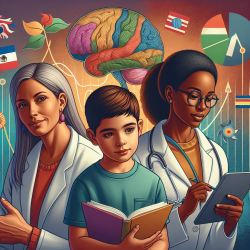The recent study titled "Communication, inclusion and psychological wellbeing among deaf and hard of hearing children: A qualitative study in the Gaza Strip" sheds light on the multifaceted challenges faced by deaf and hard of hearing (DHH) children. This blog post will focus on how practitioners can leverage these findings to improve their skills and encourage further research to foster better outcomes for DHH children.
Key Findings from the Study
The study identified several critical factors affecting the psychological wellbeing and inclusion of DHH children:
- Lack of Accessible Communication: Many DHH children face language deprivation, particularly those with moderate to profound hearing impairment.
- Community Exclusion: DHH children often experience social isolation due to limited community awareness and acceptance.
- Negative Attitudes: Stigma and discrimination from peers and community members negatively impact the mental health of DHH children.
- Limited Family Knowledge: Many families lack understanding and support for their DHH children, contributing to their psychological distress.
Implementing Research Findings
Practitioners can take several steps to address these issues and promote the wellbeing of DHH children:
Enhance Communication Skills
Providing training in sign language to families, teachers, and community members can significantly improve the communication abilities of DHH children. Schools should integrate sign language into their curriculum and offer regular workshops for parents and caregivers.
Promote Inclusive Environments
Creating inclusive environments in schools and communities is crucial. Schools should implement policies that support the inclusion of DHH children, such as hiring qualified sign language interpreters and offering specialized training for teachers.
Address Stigma and Discrimination
Raising awareness about DHH issues through community education programs can help reduce stigma and discrimination. Encouraging positive interactions between DHH children and their hearing peers can foster a more inclusive and supportive environment.
Provide Psychological Support
Mental health services should be tailored to meet the unique needs of DHH children. This includes hiring mental health professionals who are proficient in sign language and trained to address the specific challenges faced by DHH children.
Encourage Further Research
Practitioners should advocate for more research focused on the experiences of DHH children in low- and middle-income countries. This can help develop context-appropriate interventions and policies that promote the inclusion and wellbeing of DHH children.
To read the original research paper, please follow this link: Communication, inclusion and psychological wellbeing among deaf and hard of hearing children: A qualitative study in the Gaza Strip.










